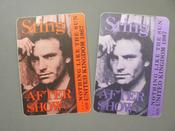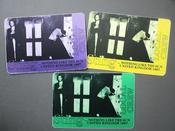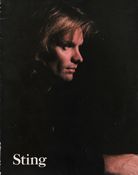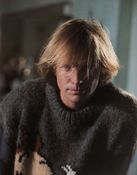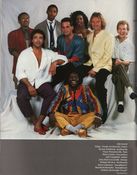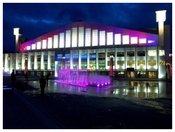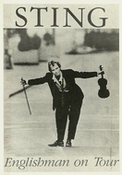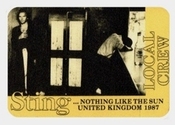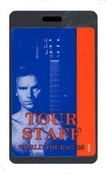
Where's the sting?
There isn't a word or phrase to describe the kind of music Sting is making nowadays. It contains morsels of everything - hints of jazz, funk. blues, pop and swing, all liquidised through the hyper-capable blender of the star's expert supporting musicians, and tickled up with some populist philosophising about the human condition. Whatever it is, people are buying it by the ton.
Sting has grown comfortably into his new ''serious adult'' role, commanding the proceedings without a great deal of outward display, stepping back while his sidepersons stretch out, moving back to centre stage to pick out a synthesizer line or to deliver some fairly accomplished guitar. His finger-picked accompaniment to 'Fragile' was particularly striking.
All well and good and jolly reassuring, but more than two hours of Sting's soberly-intentioned craftsmanship eventually begins to feel like being kidnapped by Mormons. He's got you sitting comfortably, or standing uncomfortably, and you will hear the message before you leave.
The message is packaged in several formats, rather like Sting's recordings. There's the man's personal style - he's handsome, he's rugged, he lifts weights, and he still can't quite shake the faintly condescending manner of the ex-school teacher. He chided the audience for not being 'positive' enough, and a laboriously-reworked encore of 'Don't Stand So Close To Me', the tale of teacher admired by pupil, seemed, with hindsight, like little more than narcissism rewritten for Radio 1.
Sting is also concerned about the state of the world, and frankly who isn't? He reminded us of this in a fusioned-up version of 'Driven To Tears', in 'Straight To My Hear't (in clever 7/4 time) he predicted that '' a biochemic trancel / eliminate romance,'' and he had a go at General Pinochet in 'They Dance Alone'.
This last piece is especially problematic. Over a luscious hymnal melody, the star explores the plight of the missing, the dead and the tortured in Chile, and deplores the sufferings of them and of their friends and relatives.
This was accompanied by a film-clip of Sting presenting what one presumed to be Chilean ''mothers of the disappeared '' to a huge audience, probably at one of the Amnesty Conspiracy Of Hope shows, though in their identical clothes and matching headscarves the women could have been Terry Jones and Michael Palin dressed up. Perhaps Sting should have provided a caption.
Nobody in their right mind could argue with the purpose of the song, but it doesn't sound angry or bitter or ironic or anything much more than pretty and sensitive. There's never going to be a simple, unambiguous reaction to the spectacle of millionaire megastars inviting us to share their heartwarming humanitarian concerns.
Sting's performance is massively professional, occasionally danceable, hardly ever exciting. Sometimes the band funk out, as in We'll Be Together, then there are torpid stretches which resemble the tracks you always missed out on Weather Report albums. Perhaps maintain a link with rock lineage, Sting has included one of those ridiculous lead guitarists who squawk and squitter in places where you'd much prefer them to shut up.
Star of the show is the gifted keyboards man Kenny Kirkland, whose artistry was displayed in revealing close-up by the video cameras, though one wonders if the band are ever very stretched by the simple chordal vamps over which most of their soloing takes place.
But Sting's main achievement is to have accurately judges the mood of the times, where a mild cocktail of jazz is more conveniently digested than the real thing, and where the Big issues slot in between a Big Mac and Eastenders.
(c) The Guardian by Adam Sweeting
Sting grows up...
Seeing Sting in his gaily-coloured and foppish attire bouncing around a designer stage set at Wembley, I recalled with dewy eyes the days when it was possible to utter the sentence: ''I'm new wave I am, I'm into the Police'' and still remain remarkably hip into the bargain. But those days are long gone.
And what happened to the half punk/half pin-up? Well Sting grew up; he discovered marriage, divorce, dodgy feature films, big suits, black backing musicians and mop top hair cuts. Unfortunately he forgot about the songs. Don't get me wrong, the guy's got talent and his CV will testify to the fact that he can bang out a good tune, but at Wembley they just didn't show up.
Sting started well enough with his latest 45s, 'We'll Be Together' and 'Englishman In New York', but gradually anything singable deteriorated into some sort of sub-Santana freeform jam. It would have been great in Rio, but we're British and everybody knows that the British have got lead feet. What made it worse was the all-black backing band. I half-expected him to shout ''They've got so much soul!'' after he'd introduced them all.
With a drummer and three percussionists versus three keyboards, a bass and guitar, the show was more like a heavyweight contest between rhythm and tune than any well co-ordinated glossy entertainment. Even with such a simple song as 'Bring On The Night', Sting surgically removed its framework and replaced it with a shapeless 15 minute samba. Why do pop stars do this with their material? There's no house rule at Wembley which forbids three minute pop songs from appearing on the set list.
Maybe Wembley is a test, a judgement day for pop stars. ''It is easier for a camel to pass through the eye of a needle than it is for overblown pop concerts to grace Wembley with any cred.'' ''Slurp, slurp!'' says Sting, ''I'm just sucking this camel into a point.''
(c) Record Mirror by Ian Dickson
A major force without Police...
It is not easy to convert supergroup member status into solo sales. Ask Jagger, Mercury, Waters, Plant, Daltrey et al. Yet in only three years, since the demise of the Police, Sting has gathered an audience as big as that of his former group, and made it look as simple as falling off a log.
At Wembley, he seemed torn between his role as the star at the front and a desire to remain part of the band. Thus, during a 140-minute performance, he tended to keep either a keyboard or a guitar between him and the audience, but without abrogating the immense authority that now sits so easily on his shoulders. What is this man's secret?
For one thing, the initial harnessing of a crack team of jazz players to blow through disciplined four-minute arrangements of Sting's intrinsically catchy melodies has enabled his music to mature into an idiosyncratic rock-jazz fusion that sounds neither old hat nor too familiar.
However, of that original 'Blue Turtles' team, only the keyboardist, Kenny Kirkland, and the backing vocalist Dolette McDonald, remain; and while the band that opened a five-night residency on Tuesday was stuffed full of up and coming virtuoso types, it lacked the fluency and supple capacity for nuance of its forerunner. The closing bars of a gratuitously re-arranged 'Don't Stand So Close To Me' sounded like Spinal Tap in full flow.
The personable power of Sting's delivery, in that peculiar keening register he has made his own, sustained what was an unadorned canter through recent and favourite material, mostly as written. The only significant aid to presentation was a huge video screen, which relayed crystal clear pictures of the action, but which boasted nothing approaching the sophisticated mixing standards set by Tina Turner's show earlier this year.
(c) The Times by David Sinclair
There isn't a word or phrase to describe the kind of music Sting is making nowadays. It contains morsels of everything - hints of jazz, funk. blues, pop and swing, all liquidised through the hyper-capable blender of the star's expert supporting musicians, and tickled up with some populist philosophising about the human condition. Whatever it is, people are buying it by the ton.
Sting has grown comfortably into his new ''serious adult'' role, commanding the proceedings without a great deal of outward display, stepping back while his sidepersons stretch out, moving back to centre stage to pick out a synthesizer line or to deliver some fairly accomplished guitar. His finger-picked accompaniment to 'Fragile' was particularly striking.
All well and good and jolly reassuring, but more than two hours of Sting's soberly-intentioned craftsmanship eventually begins to feel like being kidnapped by Mormons. He's got you sitting comfortably, or standing uncomfortably, and you will hear the message before you leave.
The message is packaged in several formats, rather like Sting's recordings. There's the man's personal style - he's handsome, he's rugged, he lifts weights, and he still can't quite shake the faintly condescending manner of the ex-school teacher. He chided the audience for not being 'positive' enough, and a laboriously-reworked encore of 'Don't Stand So Close To Me', the tale of teacher admired by pupil, seemed, with hindsight, like little more than narcissism rewritten for Radio 1.
Sting is also concerned about the state of the world, and frankly who isn't? He reminded us of this in a fusioned-up version of 'Driven To Tears', in 'Straight To My Hear't (in clever 7/4 time) he predicted that '' a biochemic trancel / eliminate romance,'' and he had a go at General Pinochet in 'They Dance Alone'.
This last piece is especially problematic. Over a luscious hymnal melody, the star explores the plight of the missing, the dead and the tortured in Chile, and deplores the sufferings of them and of their friends and relatives.
This was accompanied by a film-clip of Sting presenting what one presumed to be Chilean ''mothers of the disappeared '' to a huge audience, probably at one of the Amnesty Conspiracy Of Hope shows, though in their identical clothes and matching headscarves the women could have been Terry Jones and Michael Palin dressed up. Perhaps Sting should have provided a caption.
Nobody in their right mind could argue with the purpose of the song, but it doesn't sound angry or bitter or ironic or anything much more than pretty and sensitive. There's never going to be a simple, unambiguous reaction to the spectacle of millionaire megastars inviting us to share their heartwarming humanitarian concerns.
Sting's performance is massively professional, occasionally danceable, hardly ever exciting. Sometimes the band funk out, as in We'll Be Together, then there are torpid stretches which resemble the tracks you always missed out on Weather Report albums. Perhaps maintain a link with rock lineage, Sting has included one of those ridiculous lead guitarists who squawk and squitter in places where you'd much prefer them to shut up.
Star of the show is the gifted keyboards man Kenny Kirkland, whose artistry was displayed in revealing close-up by the video cameras, though one wonders if the band are ever very stretched by the simple chordal vamps over which most of their soloing takes place.
But Sting's main achievement is to have accurately judges the mood of the times, where a mild cocktail of jazz is more conveniently digested than the real thing, and where the Big issues slot in between a Big Mac and Eastenders.
(c) The Guardian by Adam Sweeting
Sting grows up...
Seeing Sting in his gaily-coloured and foppish attire bouncing around a designer stage set at Wembley, I recalled with dewy eyes the days when it was possible to utter the sentence: ''I'm new wave I am, I'm into the Police'' and still remain remarkably hip into the bargain. But those days are long gone.
And what happened to the half punk/half pin-up? Well Sting grew up; he discovered marriage, divorce, dodgy feature films, big suits, black backing musicians and mop top hair cuts. Unfortunately he forgot about the songs. Don't get me wrong, the guy's got talent and his CV will testify to the fact that he can bang out a good tune, but at Wembley they just didn't show up.
Sting started well enough with his latest 45s, 'We'll Be Together' and 'Englishman In New York', but gradually anything singable deteriorated into some sort of sub-Santana freeform jam. It would have been great in Rio, but we're British and everybody knows that the British have got lead feet. What made it worse was the all-black backing band. I half-expected him to shout ''They've got so much soul!'' after he'd introduced them all.
With a drummer and three percussionists versus three keyboards, a bass and guitar, the show was more like a heavyweight contest between rhythm and tune than any well co-ordinated glossy entertainment. Even with such a simple song as 'Bring On The Night', Sting surgically removed its framework and replaced it with a shapeless 15 minute samba. Why do pop stars do this with their material? There's no house rule at Wembley which forbids three minute pop songs from appearing on the set list.
Maybe Wembley is a test, a judgement day for pop stars. ''It is easier for a camel to pass through the eye of a needle than it is for overblown pop concerts to grace Wembley with any cred.'' ''Slurp, slurp!'' says Sting, ''I'm just sucking this camel into a point.''
(c) Record Mirror by Ian Dickson
A major force without Police...
It is not easy to convert supergroup member status into solo sales. Ask Jagger, Mercury, Waters, Plant, Daltrey et al. Yet in only three years, since the demise of the Police, Sting has gathered an audience as big as that of his former group, and made it look as simple as falling off a log.
At Wembley, he seemed torn between his role as the star at the front and a desire to remain part of the band. Thus, during a 140-minute performance, he tended to keep either a keyboard or a guitar between him and the audience, but without abrogating the immense authority that now sits so easily on his shoulders. What is this man's secret?
For one thing, the initial harnessing of a crack team of jazz players to blow through disciplined four-minute arrangements of Sting's intrinsically catchy melodies has enabled his music to mature into an idiosyncratic rock-jazz fusion that sounds neither old hat nor too familiar.
However, of that original 'Blue Turtles' team, only the keyboardist, Kenny Kirkland, and the backing vocalist Dolette McDonald, remain; and while the band that opened a five-night residency on Tuesday was stuffed full of up and coming virtuoso types, it lacked the fluency and supple capacity for nuance of its forerunner. The closing bars of a gratuitously re-arranged 'Don't Stand So Close To Me' sounded like Spinal Tap in full flow.
The personable power of Sting's delivery, in that peculiar keening register he has made his own, sustained what was an unadorned canter through recent and favourite material, mostly as written. The only significant aid to presentation was a huge video screen, which relayed crystal clear pictures of the action, but which boasted nothing approaching the sophisticated mixing standards set by Tina Turner's show earlier this year.
(c) The Times by David Sinclair

